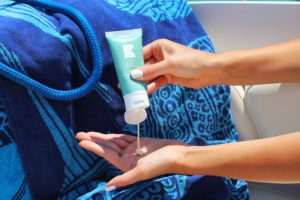We tend in summer to try and benefit from the sun, enjoy the beautiful sunny beach and get a free tan. However doing so can put us in the risk of sunburns. But now why do we get sunburned?
Sunburns
A sunburn is caused by excessive exposure to the sun’s ultraviolet (UV) rays or by exposure to artificial sources of UV rays such as tanning beds. So of course you know the idea of how you can get sunburned. Exposing your skin to the sun for prolonged periods right? But there is more into it. Basically the sun emits 3 wavelengths of ultraviolet rays which are:
- UVA
- UVB
- UVC
We do not worry about UVC as it does not reach the earth. However UVB and UVA do reach the earth and can cause harm to us.
UVA is more dangerous compared to UVB. It can go deeper than UVB so that’s why they can cause:
- Skin cancer.
- Photoaging.
- Drug-induced phototoxic/photoallergic reactions.
On the other hand, UVB has shorter wavelength and it is the reason for sunburns.
Signs and symptoms of sunburns
- Skin feel warm to touch.
- Edema or pruritic can be seen.
- Severe reactions including fever, chills, nausea, or rash.
- Dehydration symptoms.
- Blisters can develop in severe sunburns.
Know your Sunscreen
When you go to buy a sunscreen you always have this question, which SPF you should buy?
Let’s understand what is SPF first:
SPF or Sun Protective Factor is the ratio of the least amount of UVB energy required to produce minimal redness on sunscreen-protected skin to the amount of UVB energy required to produce the same redness on unprotected skin.
Now, when you go for a narrow spectrum sunscreen, you are only protected against UVB.
However, when you do buy sunscreen you should aim for UVA and UVB protection. Basically any sunscreen with SPF greater than 15, you are protected against both UVA and UVB rays. And these are called “Broad spectrum sunscreens”.
Any SPF above 50 + has limited additional benefits.
How to apply sunscreen
Sunscreen should be used if you have sensitive skin, EVEN IN WINTER. Yes even in winter or cloudy days, we are still exposed to the ultraviolet rays.
To get the most use if sunscreen:
- Rub the sunscreen in well, make sure to cover all exposed areas, especially the face, nose ,ears, feet, hands and even on the back of the knees.
- Put the sunscreen 30 minutes before going outdoors.
- Choose water-resistant sunscreen if you know you are going to sweat or after sweating. (Reapply every 2 hours in these situations).
Remember that sunscreens should be used for sun protection and not as a reason to stay in the sun for longer periods.
Some TIPS for sun safety
- Avoid exposing to the sun between 10 a.m and 4 p.m.
- Sun damaging UV rays can bounce back from sand, water, snow or concrete.
- Try to always wear sun protective clothes in summer.
- Zinc oxide or Titanium oxide sunscreens have extra protection against UVA.
- If you are on meds that can cause phototoxic reactions, consider sunscreens with Zinc oxide.
Precautions and myths about sunscreens
- Should NOT to be used for infants less than 6 months unless applied to the face or back of the hands.
- They do NOT cause Vitamin D deficiency.
- Do NOT prevent tanning unless they are “sunblocks” such as Zinc oxide and Titanium oxide.
What to read next?
https://simplifiedpharmacy.com/2021/07/03/6-supplements-you-should-take/
https://simplifiedpharmacy.com/2021/07/01/ways-to-deal-with-anxiety/
DISCLAIMER
All content and information on this website including our programs, products and/or services is for informational and educational purposes only, does not constitute medical, psychological or health advice of any kind and we do not warrant that the information presented herein is free of any errors or omissions. We are not providing medical, health care, nutrition therapy or coaching services to diagnose, treat, prevent or cure any kind of physical ailment, mental or medical condition. A professional-client relationship with you is only formed after we have expressly entered into a written agreement with you that you have signed including our fee structure and other terms to work with you in a specific matter.
Although we strive to provide accurate general information, the information presented here is not a substitute for any kind of professional advice, and you should not rely solely on this information. Always consult a professional in the medical and health area for your particular needs and circumstances prior to making any medical or health related decisions. For your health related questions, please seek the advice of a licensed physician or any other qualified health care provider immediately.

